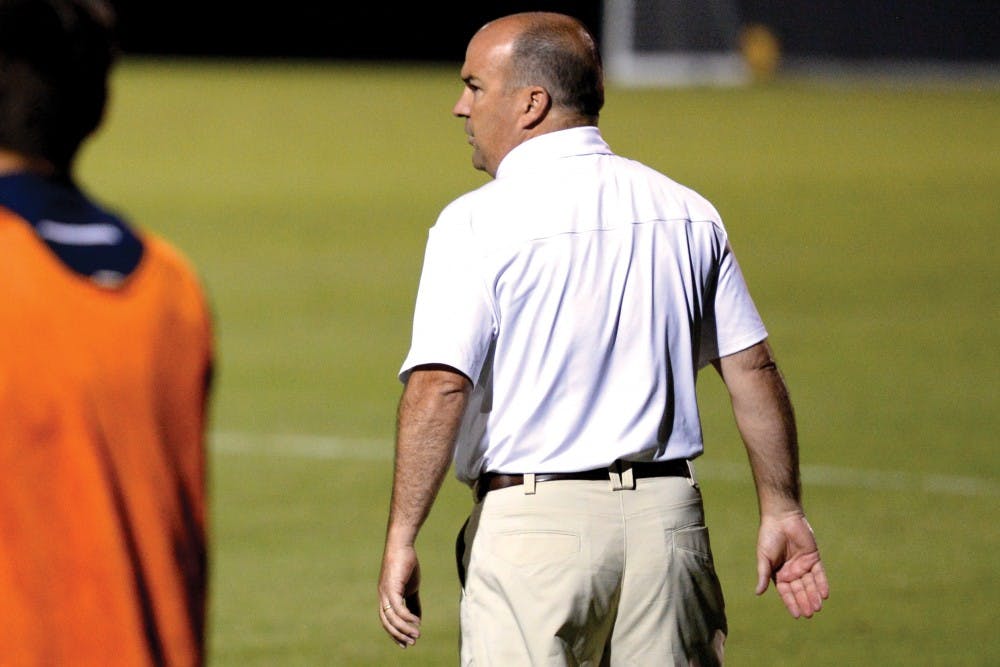
What went wrong?
As Penn men’s soccer enters its last game of the season against Harvard with only three wins to its name, that is the question on everyone’s mind. Senior captain James Rushton’s answer: “A lot.”
With nearly half of the team’s 22 members playing their first collegiate season this fall, was the team doomed from the start? Not at all.
Fuller sees a lack of consistency as the the root of the problem.
“We were never able to get any continuity,” Fuller said. “We were never able to find a rhythm with a lineup or a group of guys, because guys were coming in and out and getting injured all season long.
“That’s a huge challenge to try to overcome, especially with the young team that we have.”
Unfortunately, the Quakers (3-10-2, 1-4-1 Ivy) were unable to overcome this challenge. Despite its relative youth, the team has key players with a good deal of competitive experience under their belts.
One of the key problems, as Fuller noted, was the number of injuries this season. Many players were out for short periods of time, and with junior captain Matt Poplawski — a key player in the past two years — out for much of the season, the deck seemed to stack up even more against the Red and Blue.
But even if some of the team’s struggles can be found in its inability to field a consistent 11 for games, the Quakers were further hurt by a lack of production on offense as well.
“We’ve had injuries, we’ve had bad luck,” Rushton said. “But in the end you can talk about excuses all day long. We just weren’t good enough.”
Fuller put it in the most basic of terms, saying, “We’ve given up too many goals and we haven’t scored enough.”
In looking at Penn’s stats from the season, this assessment rings true. The Quakers have taken 151 shots in their 15 games yet only scored 12 times.
“We didn’t score goals this year,” Rushton said.
“It’s not good enough,” Fuller added. “That needs to be up around 30, and that’s been a case all year of not creating enough chances or finishing the chances we’ve created.”
On the other end of the field, Penn allowed 25 goals on 251 shots.
“I think you can look at both sides of the ball,” Fuller said. “But I think, in the end, at its core, is we haven’t been able to build the relationships over the course of the season.”
The whole season was not a complete failure for the Quakers, though. At many points throughout the season the Red and Blue controlled the game adeptly and created scoring chances. Yet problems persisted in converting those opportunities into points.
“In a physical, competitive league like the Ivy League you have to be able to win your boxes,” Rushton said. “That’s something we weren’t able to do.”
For good or bad, Penn was able to give its younger players more minutes than the average freshman usually experiences. That exposure could translate into a very successful future for the program in the years to come.
As the Red and Blue finish out their season this Saturday at Harvard (8-6-2, 4-2-0), their morale is not in the dust — far from it.
“They’ve got a spirit to them,” Fuller said. “They’ve stayed the course and stayed in it, so we are looking to a good game Saturday.”
Perhaps that spirit will translate into one final victory, and a sweet end to an otherwise bitter season.
The Daily Pennsylvanian is an independent, student-run newspaper. Please consider making a donation to support the coverage that shapes the University. Your generosity ensures a future of strong journalism at Penn.
DonatePlease note All comments are eligible for publication in The Daily Pennsylvanian.







